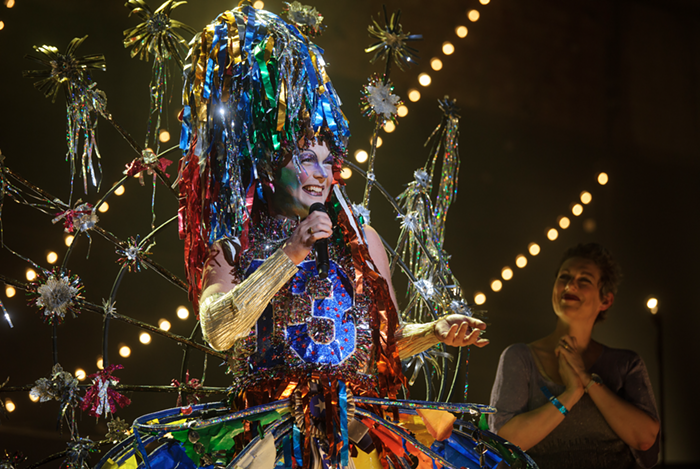Portland hasn’t seen a Taylor Mac performance since the 2011 Time Based Arts Festival, when then arts editor Alison Hallett famously got into an in-print tiff with reviewer Noah Dunham over their conflicting interpretations of Taylor Mac’s show Comparison Is Violence, or the Ziggy Stardust Meets Tiny Tim Songbook.
But the MacArthur Genius theater performer returns to this fertile valley with a bang at the end of March, performing the abridged version of A 24-Decade History of Popular Music in concert with the Oregon Symphony. For this project, Portland is a sounding board. Taylor Mac has never performed the show live with an orchestra before, and it’s monumental that judy chose ours—Taylor Mac’s preferred pronouns are judy.
Previous concerts of the abridged 24-Decade have involved audience reenactments and towering dick balloons, not to mention wonderful musical reimaginings of classic songs that sent critics swooning. The Mercury spoke with Taylor Mac about what the audience could expect from the groundbreaking show.
Taylor Mac remained coy throughout our interview, but the show’s management eventually revealed that the Portland show will present “new arrangements of iconic hits of their time from American standard ‘Only You’ to early ’80s anthem ‘Gloria.’”
I’ve had “Gloria” stuck in my head ever since.
MERCURY: Thus far, I haven’t been able to get a solid description of what the show will be. 24-Decade was once actually 24-hours. Will this be a 24-hour show?
TAYLOR MAC: This one will be roughly 90 minutes. What I do is I take all the material from the 24-hour show and I choose a theme. Then I select songs from the splattering of the decades that work with the theme.
In theory, we call this the abridged show, but we’ve only ever performed the whole 24-hour show once. We’ve performed the abridged show many times, but performing it with a symphony orchestra is a whole new big adventure. We have a whole new set of arrangements by Ted Hearne and hope to tour it to other orchestras, but this is our first attempt.
Someone at the 24-hour show showed me some video of 30-foot-long, USSR and USA penis-shaped balloons that the audience floated around. Will we get enormous penis balloons?
Those were for a particular event that happened during the ’80s, during a Cold War portion of the show.
And the audience made them swordfight.
That was one of my favorite moments in the long duration show. But we have tricks up our sleeve everywhere we go. I really try to base all of the shows on surprise. As a theater artist, I like to surprise the audience continually. Every 30 seconds there needs to be something surprising.
Pre-pandemic, your show was famous for picking people from the audience—called “human sacrifices”—for group reenactments of historical events. Will that be possible at this show? Do you have any advice for those seeking to be a human sacrifice?
[Laughs] Someone who wants to be a human sacrifice? It’s interesting, when you talk about participation in the theater, usually everyone freaks out. They hate participation. But when we’re out in the world at, like, sporting events—those all have some form of participation.
When I talk about sacrifice, what I'm talking about is, like, sacrificing the individual as a way to get to the collective experience. So you sacrifice your individuality a little bit when you go to a ballgame—and participate in the chants and big waves—so that you can join in on the collective experience.
But to actually answer your question, I don't like to pick the people that absolutely don't want to do it. I also don't really like to pick the people that are super eager to do it, because they tend to be a little bit too performative. I'm always looking for that person for whom it takes a little bravery. Those are the people that I tend to be drawn to.
How did this partnership come to be? It’s amazing that Portland gets to be the first to do this show with you.
Through my producer, Linda Brumbach from Pomegranate Arts. She's pretty savvy about what's going on in the country, and in the world in terms of the art scene. And she had a hunch that Portland would be game. Some other companies might just not want to embrace the populist form of it. But I love that we're doing it, and the Ted Hearne arrangements which we’ve been practicing—they’re a whole ‘nother creature. If you're familiar with some of these songs, you’ve never heard 'em done like this before. Gonna be fun.
In the past you’ve used “judy” for your pronouns. Is that still the case?
Yeah, I use judy. I view it as... it's a gift. If you want to use it, great. If not, okay. I still prefer it. I still like it. I think it describes me quite well. I could go on for hours about pronouns.
What does it mean to you? It's pretty common queer slang, but it seems a little more profound than a simple reference to Judy Garland.
Well, I’m not gonna say no to anything about Judy Garland. But for me it comes from when queer men used to call their lovers “Mary” or “Judy” at the bar, as code. So they wouldn’t, you know, be fired, fag-bashed, killed, or arrested. So I just thought that—combined with the sort of wild street performance aspects of Punch and Judy... yeah, sure, why not Judy Garland and all the Judys of the world—it described me quite well.
I’m not trying to dictate for other people, but for me gender is a performance. I don’t think of myself as male or female. I think of myself as: performer. So I want a pronoun that means something to me and isn’t something some kids in a Bard College classroom decided was appropriate to use for a genderqueer person.
I mean, I know it’s annoying, but so is “he” and “she.” As a writer, it’s actually a fun exercise to try to pay attention to this stuff.
Each performance of 24-Decade generally has its own unique theme. Is there any chance of getting you to tell us what Portland’s will be?
I’m still thinking about it. I don’t like to do things too far in advance. I’m checking in on what’s happening locally in Oregon, Portland, and the West Coast. But there are certain things that I know we’re going to do. There will be sacrifices [laughs ominously] of some things that we’re holding onto that really aren’t so useful. The entire show is about building community as a result of being torn apart.
Wow, that unexpectedly hit me—that concept.
Yes, I’ve been trying to focus on something that is tearing us apart. Then, how can we build ourselves, with the calamity of being torn apart? What can we do to transform this thing? That’ll be the thrust. It’s a really inspiring story when you look at it not from the lens of the oppressor, but from the perspective of the people who navigate that oppression.
Arlene Schnitzer Concert Hall, 1037 SW Broadway, Thurs March 31, 7:30 pm, more info and tickets














